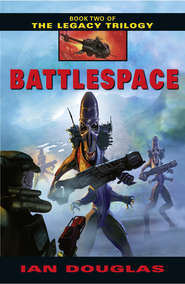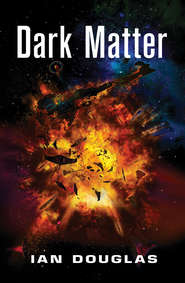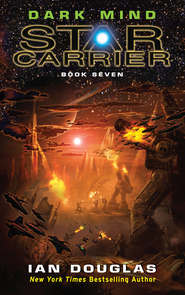По всем вопросам обращайтесь на: info@litportal.ru
(©) 2003-2024.
✖
The Star Carrier Series Books 1-3: Earth Strike, Centre of Gravity, Singularity
Настройки чтения
Размер шрифта
Высота строк
Поля
The devastation had been incalculable. The loss of life, fortunately, had been less than it might have been, since most of the world’s coastline cities were already slowly being evacuated in the face of steadily rising sea levels. Even so, an estimated half billion people had died, from West Africa to Spain, France, and England, to the slowly submerging cities of the U.S. East Coast, to the vanishing islands of the Caribbean, to the coastlines of Brazil and Argentina. The ancient term weapon of mass destruction had, with that single deadly blow, taken on a radically new and expanded meaning. Coming hard on the heels of the deaths of 1.5 billion people in the Blood Death pandemic, Wormwood’s fall into the Atlantic had come close to ending technic civilization across much of the Earth.
The partial success of the American-EU fleet, however, had spurred further cooperation, and the rapid expansion of the automated High Guard project that had been in place for the previous century. Every space-faring nation on the planet—even the recently defeated Chinese Hegemony—had contributed ships and personnel to the newly expanded High Guard, with the sacred charge that never again would mountains fall from the sky. The Guard’s motto was “A Shield Against the Sky.” Its headquarters was located in neutral Switzerland, at Geneva.
Two centuries later, with the Sh’daar Ultimatum, the High Guard offered the teeming worlds and colonies of the inner solar system their best first line of defense against this new and still mysterious enemy. Their charter had been expanded; besides watching for nudgers—the ships of nation-states or terrorists attempting to push asteroids or comets into new and Earth-threatening orbits—they were tasked with patrolling the outer perimeter of the solar system, identifying incoming ships and, if they were hostile, engaging them.
The High Guard’s oath, a solemn and sacred promise sworn before the souls of those who had died at the Battle of Wormwood, both in space and in the thunderous doom of the incoming tsunamis, offered the lives of the High Guard’s men and women as a literal shield against any threat from the solar system’s depths.
It was an immense task … one far too vast to be practical. The High Guard currently numbered about two hundred warships, most of them aging Marshall-class destroyers like the Gallagher, or the even older Jackson-class frigates. At any given time, at least half of those vessels were in port for refit, maintenance, and resupply. Typically, they deployed for nine months at a time, patrolling out beyond the orbit of Neptune, serving as backup to the half million remote probes in the forty-AU shell.
That arbitrary shell around Sol gave scale to what was lightly called “the vastness of space.” The surface area of a sphere with a radius of 40 astronomical units was over 20,000 square AUs … close to 450 quintillion square kilometers.
That worked out to one ship per four and a half quintillion square kilometers—an obvious impossibility. In fact, both patrols and remote sensors tended to be concentrated within about 30 degrees of the ecliptic, which cut down things a bit … but there was always the possibility that an enemy would sneak in from zenith or nadir, where tens of billions of kilometers separated one sentry from the next.
Thinly spread or not, in the thirty-seven years since the Sh’daar Ultimatum, not one alien vessel had approached Earth’s solar system, and the general perception of the civilian population back home was that the war was far away, too far to be a threat.
According to the data flooding in through Gallagher’s sensors, that illusion of security had just been ripped away. At least thirty Turusch warships had materialized almost seven hours ago, some six light hours out from the sun and 25 degrees above the ecliptic … roughly in the same part of the sky as Arcturus and Eta Boötis. Exactly what they’d been doing since then was not clear; the ships weren’t registering on long-range tracking, and no more data was coming through from Triton since that one, quick, burst transmission.
But Lederer could make a good guess. Confederation tactics called for launching a high-G fighter or near-c bombardment of the target immediately, so that local defenses were overwhelmed. It was possible that enemy near-c impactors were already approaching Earth.
The main fleet would accelerate toward the target behind the bombardment and fighters. Turusch ships, depending on their class, could accelerate at anywhere between three hundred and six hundred gravities. That meant that by now they could have traveled anywhere between one and two billion kilometers—say, between six and thirteen astronomical units.
Based on that data, and the assumption that the invaders would be heading for the inner system as quickly as possible, Lederer had given orders to attempt an intercept, calculating an IP—an intercept point—some five AUs ahead, just beyond the orbit of Neptune, and trailing that world by half a billion kilometers. Ideally, all five High Guard vessels would reach the IP within a few minutes of one another.
The operation was not unlike hitting one high-velocity bullet head-on simultaneously with four other bullets, with the marksmen all firing blindfolded. Still, Gallagher might be able to get close enough to send Earth an updated report … if the enemy fleet was behaving in a predictable manner.
And if there still was an Earth to report to.
“Nav, this is the captain,” he said.
“Yeah, Skipper.”
“If Triton went off the air, it probably means a strike there.”
“Roger that, Skipper. Combat thinks it might have been near-c impacters.”
“Right. But it’s also possible that the Trash fleet showed up in person. They don’t know anything about the layout of our solar system, no more than we know about theirs. The smart play might be to muster their fleet somewhere close to the first large outpost they pick up … and that would be Triton. From there, they could watch our response, scope out our defenses, maybe plan a long-range strike once they know where our orbital bases and inhabited worlds are.”
“Makes sense, sir.”
“I want you to prepare a series of course plots. Assume we don’t find anything at the IP. I want you to give me a vector that will carry us into Neptune space. I also want a plot that will send one or two of our ships straight to Triton, bypassing the IP.”
“Aye, aye, sir. Give me a moment here. …”
Five aging frigates and destroyers against at least thirty Turusch warships … probably more by now, probably a lot more.
The odds, he thought, were not at all good.
Manhattan Ruins
North American Periphery
2009 hours, local time
“Hello! Anyone here?”
Gray’s voice echoed back at him from empty passageways and silent chambers. It seemed impossible that TriBeCa Arcology could be vacant … but he’d been searching through its halls for over an hour now, and he had yet to see any other humans.
He walked down the passageway leading to the suite of rooms he’d lived in with Angela, carrying the rented gravcycle over his shoulder. The broom was his ticket out of this place, and he knew that had he left it up on the roof where he’d landed, it would have been gone by the time he returned.
And that had been an odd point, too, now that he thought about it. His family had always maintained a watch up on the arc roof, but there’d been no one there when he’d landed. What in hell was going on?
“It’s Trevor! Trevor Gray!” he yelled. He thought he heard a scuttling sound in the distance, the scrape of shoes on floor tiles. He wasn’t certain. It might have been rats. “I’m looking for the TriBeCan Eagles! Is anyone here?”
The sun had set some time ago, and it was dark. Gray was wearing a small but powerful wristlight that illuminated the passageway ahead, but he was beginning to worry about getting lost in this maze.
He thought this was the way. …
Yes! That was the entrance to the rooms he’d shared with Angela!
Of course his old quarters had long since been occupied by someone else. Ragged curtains had been hung to divide large spaces into smaller, private areas. Mattresses and blankets lay on the floors. The remains of a cook fire, the ashes still warm to the touch, had blackened a patch on what once had been the floor of a sunken living room. None of this stuff was his, however. Others had moved in after he and Angela had gone.
Which was only to be expected. But … surely they would remember him? It had only been five years, after all.
“Chiseler!” he shouted, almost screaming the name.
He walked over to the living-room window, what once had been an actual wall-sized picture window and sliding door with a balcony outside. When he and Angela had lived here, the balcony had been long gone, crumbled away a century before, but the window had still been solid, a sheet of scratched and sun-clouded plasglas extending from floor to ceiling. The plasglas was gone now, the opening admitting a steady spray of cold mist from the ongoing drizzle outside.
Carefully, he put a hand out to one frame of the vanished door and looked down, four hundred meters to the water, the depths between island-buildings lost in the growing darkness below, though there was still pale light in the sky. Vines growing on the outside surface of the arcology were curling in through the missing window, and beginning to flourish on the inside.
So why hadn’t the Authority reclaimed the Ruins? The largest buildings, like TriBeCa, were still sound. There’d been plans to rebuild the Old City out over the water using structures like the TriBeCa Arcology as pylons, he knew, for two centuries or more. It was technically feasible, at least.
There’d been no money for such projects after the Crash in the late twenty-second century, when nanotech had overthrown the old economic models. But things were prosperous enough now. At least for the rest of the Confederation.
Maybe people just got used to things the way they were. So far as that peaceforcer up in Morningside Heights was concerned, the squatties had always been here, the Ruins always a place of danger and primitive discomfort.
It hadn’t always been so, though. He and Angela had often stood on this spot, trying to imagine what life had been like when the Old City had been alive, vibrant with power and life, the first and greatest of the modern megalopoli. He’d seen old memory clips of the city before the first evacuations in the twenty-first century. Primitive … but astonishing, breathtaking, and miraculous in scope and in audacity, nonetheless.
He sensed, rather than heard, the movement at his back.
Gray spun, the gravcycle snapping down off his shoulder and into a port-arms position. The squattie was halfway across the sunken floor, short, black-haired, clad in stinking rags. He was holding a spear made from a lightweight metal rod with a kitchen knife taped to the end.
The man was rushing him, clearly intent on either stabbing Gray in the back or knocking him forward through the window, and into a four-hundred meter drop to the water below. Gray snapped out with the back end of the gravcycle, using it like a quarterstaff, blocking the man’s lunge and sharply bending the light metal rod of his improvised spear.
“Stop!” Gray shouted. “I’m not your enemy!”
His attacker barked something in an unknown language, and Gray’s eyes widened at a sudden realization. His attacker was Asian.
But that wasn’t possible.











